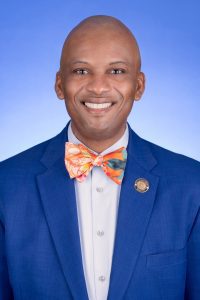|
Getting your Trinity Audio player ready...
|
 I graduated from the University of Miami School of Law in 2000. Every morning, I’d catch the 27 Metrobus to the Martin Luther King Jr. Metrorail station and take the Metrorail to the University of Miami. I’d take that same route back home, and sometimes my dad would pick me up at the Metrorail station and ask, “What did you learn today?” With every bus ride, with every time I took the Metrorail, I was getting closer to my dream of being an attorney. I was also bringing all the skills that I was learning at the University of Miami School of Law back home to Miami Gardens. That’s what public transportation did for me. I became an attorney, the mayor of my hometown, and now the Chairman of the Miami-Dade Board of County Commissioners. I want that opportunity and accessibility for every Resident of Miami-Dade County.
I graduated from the University of Miami School of Law in 2000. Every morning, I’d catch the 27 Metrobus to the Martin Luther King Jr. Metrorail station and take the Metrorail to the University of Miami. I’d take that same route back home, and sometimes my dad would pick me up at the Metrorail station and ask, “What did you learn today?” With every bus ride, with every time I took the Metrorail, I was getting closer to my dream of being an attorney. I was also bringing all the skills that I was learning at the University of Miami School of Law back home to Miami Gardens. That’s what public transportation did for me. I became an attorney, the mayor of my hometown, and now the Chairman of the Miami-Dade Board of County Commissioners. I want that opportunity and accessibility for every Resident of Miami-Dade County.
For this August’s primary election, I placed a simple question on the ballot: “Does Miami-Dade County need to expand its existing rapid mass transit system?”
This question isn’t just about moving from Point A to Point B; it’s about moving from the past to the future. It’s about understanding and respecting who we were and acknowledging and curating who we must become. It’s about fostering economic growth, promoting Miami-Dade’s position as a world-class community, and improving the quality of life for all. The clear and unequivocal answer should be a resounding “Yes.” and here’s why:
Investments in transit act as powerful economic multipliers. Expanding our rapid mass transit system will grow our economy by getting people to the jobs they want and the services they need. In 2022, traffic congestion cost the average driver $1,852, which equates to $8.13 billion for our urban area. Other studies have shown that every dollar invested in public transportation generates approximately four dollars in economic returns. Investments in mass transit increase property values, which supports the expansion of services to neighborhoods and attracts businesses seeking easy access to a skilled workforce.
Workers across the county should not be forced to sit in traffic for hours, spending thousands of dollars on gas just to travel to and from work. Expanding our rapid mass transit system will enable more Residents to reach job centers and educational institutions. This is particularly important for workers who drive Miami-Dade’s tourism industry and, for years, have been priced out from living near our major tourism hubs. A good transit system not only allows for more housing options to be built along corridors, it creates housing options that are both sustainable for our economy and our environment.
Public transit is the great equalizer. It provides mobility to all and ensures that everyone can participate in the economic and social growth of this community.
Critics will bring up the billion-dollar price tag of mass transit as the reason to maintain the status quo. To them, I ask, what’s your plan? Forty years ago, building 46 miles of rapid transit cost between $400 to $660 million. Building mass transit hasn’t gotten cheaper, it won’t get cheaper, and waiting isn’t a solution – it’s an excuse.
We live in the Miami-Dade County that was created for us. It now falls to us to create a Miami-Dade County that will work for our grandchildren. I want a Miami-Dade County where planning isn’t taboo and traffic congestion isn’t an accepted way of life. This Miami Dade County requires us to be leaders at every level and not stewards of the status quo.
Expanding mass transit isn’t just about moving people; it’s about moving our community forward. It’s about a kid who was able to get his law degree because of the 27 Metrobus and a ride on the Metrorail and providing that same opportunity for generations of Miamians to come. Let’s seize this moment to build a brighter, more connected, and prosperous Miami-Dade County. Vote “Yes”, #400 on your August ballot.
Oliver G. Gilbert III, a kid who rode public transit to get his law degree. He is also the Chairman of the Miami-Dade County Board of County Commissioners and the County Commissioner for District 1.





